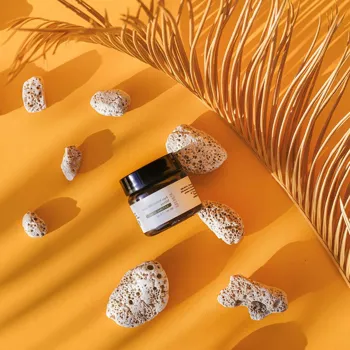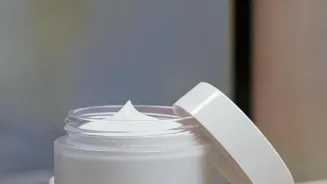Unlocking the Power of Retinol: A Desi Guide to Radiant Skin! Delve into the magic of retinol for a flawless complexion
In the bustling world of skincare, where new products and ingredients seem to pop
up every other day, retinol remains a true champion. It's an age-old ingredient dermatologists swear by, and for good reason.
But for many Indians, especially those new to the skincare game, retinol can seem a bit intimidating. What exactly does it do? How do you use it without irritating your skin? Let's break down the benefits and best practices for incorporating retinol into your routine, the desi way.
Retinol, derived from Vitamin A, is a powerhouse skincare ingredient with multiple benefits for skin
Retinol is a type of retinoid, which is derived from Vitamin A. Think of Vitamin A as the big boss and retinoids as its team of superheroes. Retinol is one of the milder, over-the-counter retinoids, making it a good starting point for most people. Why the hype? Well, retinol is a multi-tasker.
It works wonders on a number of skin issues. It speeds up cell turnover, which means it helps shed old, dead skin cells faster, revealing fresher, brighter skin underneath. This also helps to unclog pores, making it a great option for those battling acne. But the benefits don't stop there!
Retinol also stimulates collagen production. Collagen is like the scaffolding that keeps our skin firm and youthful. As we age, collagen production naturally declines, leading to wrinkles and fine lines. Retinol to the rescue! It helps boost collagen, making skin appear smoother and more plump.
It can also help fade hyperpigmentation, like those pesky dark spots left behind by acne or sun damage. Basically, it's a powerhouse for achieving a more even-toned, youthful-looking complexion. Because of its potency, understanding how to use it carefully is of utmost importance.
It's about gently training the skin, not shocking it into submission!
Choose retinol based on skin type, start low, be patient for results
Now, before you rush out and grab the first retinol product you see, it's important to consider your skin type and concerns. Retinol comes in various strengths, from serums to creams, and even in some lotions. If you have sensitive skin, start with a low concentration, like 0.01% or 0.03%.
This will allow your skin to adjust gradually without causing severe irritation. For those with oily or acne-prone skin, a slightly higher concentration might be suitable, but still start slow.
Creams are typically more hydrating and better suited for dry skin, while serums are lightweight and ideal for oily skin. Look for products that also contain hydrating ingredients like hyaluronic acid or ceramides. These can help to counteract the potential drying effects of retinol.
Pay attention to the formulation as well. Airless pumps or opaque packaging are preferred, as retinol can degrade when exposed to light and air. Reading reviews from other desi users with similar skin types can also provide valuable insights. Remember, consistency is key, but so is patience.
Don't expect to see overnight miracles. It takes time for retinol to work its magic.
Start slow with retinol, build up gradually for skin adaptation
Alright, so you've chosen your retinol product. Now, let's talk application. The golden rule with retinol is to start slow and build up gradually. Don't jump straight into using it every night. Instead, begin with once or twice a week. Apply a pea-sized amount to clean, dry skin.
It's crucial to wait at least 20-30 minutes after cleansing before applying retinol. This allows your skin to fully dry, reducing the risk of irritation. If you apply retinol to damp skin, it can penetrate deeper and faster, increasing the chances of redness, peeling, and dryness.
When starting, apply a thin layer to the entire face, avoiding the delicate eye area. If you experience any irritation, you can try the "sandwich" method, applying a layer of moisturizer before and after retinol. This creates a buffer and helps to minimize dryness.
As your skin gets used to retinol, you can gradually increase the frequency of application. Some people eventually work their way up to using it every other night or even every night, but listen to your skin and adjust accordingly. Remember, less is more!
Starting retinol? Expect a purge. Manage side effects with care
Let's be real, retinol isn't all sunshine and rainbows. Many people experience some side effects when starting out, commonly referred to as the "retinol purge." This is a period where your skin might break out more than usual.

This is because retinol speeds up cell turnover, bringing underlying congestion to the surface. While it can be frustrating, it's usually temporary and a sign that the retinol is working. However, it's important to differentiate between a purge and an allergic reaction.
If you experience severe redness, swelling, itching, or burning, stop using the product immediately and consult a dermatologist. Other common side effects include dryness, peeling, and sensitivity to the sun. To combat dryness, use a rich moisturizer, both morning and night.
And sunscreen is absolutely non-negotiable! Retinol makes your skin more sensitive to UV rays, so wearing a broad-spectrum sunscreen with an SPF of 30 or higher is essential, even on cloudy days. Reapply sunscreen every two hours, especially if you're spending time outdoors.
Hydrating from within is also important. Drink plenty of water to keep your skin hydrated and healthy. If you're experiencing persistent irritation, consider reducing the frequency of retinol application or switching to a lower concentration.
Don't be afraid to take breaks from retinol if your skin needs it.
Sunscreen and gentle skincare are crucial when using retinol
We've already hammered this point home, but it's worth repeating: sunscreen is your best friend when using retinol. Think of it as your shield against the sun's harmful rays. Choose a broad-spectrum sunscreen that protects against both UVA and UVB rays.
Look for ingredients like zinc oxide or titanium dioxide, which are physical sunscreens that are generally well-tolerated. Apply sunscreen liberally to all exposed areas of your skin, including your face, neck, and ears. Reapply every two hours, or more often if you're sweating or swimming.
In addition to sunscreen, a gentle skincare routine is crucial. Avoid harsh cleansers, scrubs, and other potentially irritating ingredients. Opt for a mild, hydrating cleanser that won't strip your skin of its natural oils.
Use a moisturizer that contains ingredients like ceramides, hyaluronic acid, or glycerin to keep your skin hydrated and protected. Avoid using other active ingredients, like AHAs or BHAs, at the same time as retinol, as this can increase the risk of irritation.
If you want to use these ingredients, alternate them on different nights or days. Simplicity is key when it comes to skincare while using retinol. Focus on gentle cleansing, hydration, and sun protection.
Retinol is a long-term commitment with lasting skin benefits
Retinol isn't a quick fix. It's a long-term commitment. It can take several weeks or even months to see noticeable results. Don't get discouraged if you don't see overnight miracles. Stick with it and be patient. The long-term benefits of retinol are well worth the effort.
You'll notice improvements in skin texture, tone, and elasticity. Fine lines and wrinkles will appear softened, and your complexion will look brighter and more youthful. Retinol can also help to prevent future signs of aging.
By stimulating collagen production and speeding up cell turnover, it helps to keep your skin healthy and resilient. While retinol is generally safe for most people, it's always a good idea to consult with a dermatologist, especially if you have any underlying skin conditions or concerns.
A dermatologist can assess your skin and recommend the best retinol product and routine for your individual needs. They can also help you to manage any potential side effects and ensure that you're using retinol safely and effectively. Remember, skincare is a journey, not a destination.
Be patient, be consistent, and listen to your skin. With the right approach, retinol can be a game-changer for your complexion.
AI Generated Content. Glance/InMobi shall have no liability for the content













